一般现在时主语三单的动词变化及练习(汇编)
一般现在时主语三单的动词变化及练习精编版
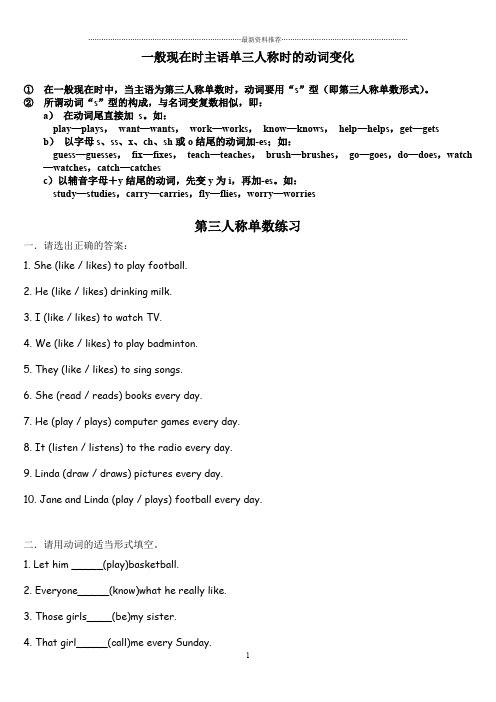
一般现在时主语单三人称时的动词变化①在一般现在时中,当主语为第三人称单数时,动词要用“s”型(即第三人称单数形式)。
②所谓动词“s”型的构成,与名词变复数相似,即:a)在动词尾直接加s。
如:play—plays,want—wants,work—works,know—knows,help—helps,get—getsb)以字母s、ss、x、ch、sh或o结尾的动词加-es;如:guess—guesses,fix—fixes,teach—teaches,brush—brushes,go—goes,do—does,watch —watches,catch—catchesc)以辅音字母+y结尾的动词,先变y为i,再加-es。
如:study—studies,carry—carries,fly—flies,worry—worries第三人称单数练习一.请选出正确的答案:1. She (like / likes) to play football.2. He (like / likes) drinking milk.3. I (like / likes) to watch TV.4. We (like / likes) to play badminton.5. They (like / likes) to sing songs.6. She (read / reads) books every day.7. He (play / plays) computer games every day.8. It (listen / listens) to the radio every day.9. Linda (draw / draws) pictures every day.10. Jane and Linda (play / plays) football every day.二.请用动词的适当形式填空。
1. Let him _____(play)basketball.2. Everyone_____(know)what he really like.3. Those girls____(be)my sister.4. That girl_____(call)me every Sunday.5. How___(do)she_____(spell)the word?6. He________ TV every evening. (watch)7. We always ________ to school on foot. (go)8. Tom, with his classmates, often ______ football after school. (play)9. Your shoes _______ under the bed. (be)10. ______ here and ______ by me. (come, stand)11. His uncle usually _________ to work by bus. (go)12. I always ______ up at six in the morning.(get)13. John ________ like his father. (look)三.请用have或has填空。
(完整版)小学英语一般现在时三单动词的变化规则及练习题

一般现在时三单动词的变化规则及练习题1.一般情况下,直接加-s 2.以s. x. sh. ch. o结尾,加-es 3.以“辅音字母+y”结尾,变y为i,再加-es一、写出下列动词的第三人称单数drink ________ go _______ stay ________ make ________ look _________ have_______ pass_______ carry ____ come________ watch______sing_______ fly ________ study_______ brush________ do_________ teach_______二、用括号内动词的适当形式填空。
1. He often ________(have) dinner at home.2. Daniel and Tommy_______(be) in Class One. 3. We _______(not watch) TV on Monday. 4. Nick _______(not go) to the zoo on Sunday.5. What _______they often _______(do) on Sundays?6. _______ your mother _______(read) newspapers every day?7. Mike _______(like) cooking. 8. I _______(be) ill. I’m in bed. 9. Liu Tao _______(do) not like PE. 10. The child often_______(watch) TV in the evening.三、按照要求改写句子1. He watches TV every evening.(改为否定句)___________________________________________________2. I do my homework every day.(改为一般疑问句,作否定回答) ________________________________________________3. She likes books.(改为一般疑问句,做肯定回答)_______________________________________________________4. Amy likes playing computer games.(改为一般疑问句,作否定回答)________________________________________________________5. We go to school on Sundays.(改为否定句)_______________________________________________________四、改错(划出错误的地方,将正确的写在横线上)1. Is your brother like English? __________________2. Does he likes swimming? __________________3. He likes play games. __________________4. Shedon’tdo her homework on Sundays. _________________五、把句子补充完整。
第三人称单数形式(汇编)

第三人称单数形式动词,在英语众多词汇中堪称变脸的高手,遇到不同的人称、数和时态,它总会以不同的面孔登场。
本期将重点向同学们介绍在一般现在时的句子中,当主语是第三人称单数时,英语动词的变化规则。
一般现在时的肯定句中,主语为第三人称单数的动词变化主要体现在词尾的变化上,其规律大体有三点:1. 一般情况下,直接在动词词尾+s ,例如:get→gets; take→takes2. 以s, sh, ch, x, o 结尾的动词,在词尾+ es,例如:teach→teaches; fix→fixes; go→goes3. 以辅音字母+ y 结尾的动词,变y 为i,再+ es,如:study→studies; try→tries除上述规律外,还应注意下面三点:1. 动词have ,遇到主语是第三人称单数时,要用has;动词be 的第三人称单数形式是is。
2. 含有动词第三人称单数形式的句子变否定句时,要用doesn't + 动词原形,如:He goes to school at six in the morning. (变否定句)→He doesn't go to school at six in the morning.3. 对含有动词第三人称单数形式的句子提问时,要用助动词does,如:She goes home at five every day. (对划线部分提问)→When / Whattime does she go home every day?综上所述,只要我们洞悉了英语动词第三人称单数形式的变化规则,在一般现在时的句子中,我们都能从容应对,客随主“变”了。
【动词第三人称单数的变化规则及发音规律】动词原形变第三人称单数的规则与发音规律同名词单数变复数大致相同,请认真观察。
1、大多数动词在词尾加“S”在清辅音后发音为[s],在浊辅音及元音后发音为[z]。
如:①stop-stops [s] ; make-makes [s]②read-reads [z] ; play-plays [z]2、以辅音字母加“y”结尾的,要先将“y”变为“i”,然后在加“es”读[iz] 如:fly-flies [z];carry-carries [z]study-studies [z]; worry-worries3、以“s, x, ch, sh”结尾的,在词尾加“es”,发音为[iz] 如:teach-teaches [iz]; watch-watches [iz]4、以“o”结尾的动词,加“es”,读[z] 如:go-goes [z] do-does [z]下面几个动词变为单数时,原词的元音部分的发音发生了较大的变化,请注意记忆。
一般现在时(第三人称单数形式_)及练习

般现在时(第三人称单数形式 )Hello, boys and girls我是一般现在时,你们想知道我的故事吗Let me tellyou!首先,介绍我的本领。
我的本领有三样:1.表示事物或人物的特征、状态。
如:The sky is blue天空是蓝色的。
2.表示经常性或习惯性的动作。
如:I get up at six every day我每天六点起床。
3.表示客观现实。
如:The earth goes aro und the sun 地球绕着太阳转。
第二,请看我的面目--构成:1.b e动词:主语+be(am ,is ,are)+其它。
如:I am a boy我是一个男孩。
2.行为动词:主语+行为动词(+其它)。
如:We study En glish我们学习英语。
当主语为第三人称单数(he, she ,it)时,三单变化:1.多数在动词后加s,play—plays like —likes2.以s,x,sh,ch,o 结尾的动词加es go—goes wash —washes4.以辅音字母加y 结尾,把y 改i 再加es,fly—flies 。
元音字母加y 结尾的,直接加s,play-plays 。
5.特殊:have-has第三,我的变化--否定句、一般疑问句、特殊疑问句:1.be 动词的变化。
否定句:主语+ be + not +其它。
如:He is not a worker他不是工人。
一般疑问句:Be +主语+其它。
如:-Are you a student -Yes. I am. / No, I'm not.特殊疑问句:疑问词+一般疑问句。
如:Where is my bike2.行为动词的变化。
否定句:主语+ don't( doesn't ) +动词原形(+其它)。
如:I don't like bread. 当主语为第三人称单数时,要用doesn't 构成否定句。
一般现在时(第三人称单数形式_)及练习

一般现在时(第三人称单数形式_)及练习一般现在时(第三人称单数形式)Hello, boys and girls.我是一般现在时,你们想知道我的故事吗Let me tell you!首先,介绍我的本领。
我的本领有三样:1.表示事物或人物的特征、状态。
如:The sky is blue.天空是蓝色的。
2.表示经常性或习惯性的动作。
如:I get up at six every day.我每天六点起床。
3.表示客观现实。
如:The earth goes around the sun.地球绕着太阳转。
第二,请看我的面目--构成:1. be动词:主语+be(am ,is ,are)+其它。
如:I am a boy.我是一个男孩。
2.行为动词:主语+行为动词(+其它)。
如:We study English.我们学习英语。
当主语为第三人称单数(he, she ,it)时,三单变化:1.多数在动词后加s,play—plays like—likes2.以s,x,sh,ch,o结尾的动词加es go—goes wash—washes 3.4.以辅音字母加y结尾,把y改i再加es,fly—flies。
元音字母加y结尾的,直接加s,play-plays。
5.特殊:have-has第三,我的变化--否定句、一般疑问句、特殊疑问句:1.be动词的变化。
否定句:主语+ be + not +其它。
如:He is not a worker.他不是工人。
一般疑问句:Be +主语+其它。
如:-Are you a student -Yes. I am. / No, I'm not.特殊疑问句:疑问词+一般疑问句。
如:Where is my bike2.行为动词的变化。
否定句:主语+ don't( doesn't ) +动词原形(+其它)。
如:I don't like bread.当主语为第三人称单数时,要用doesn't构成否定句。
第三人称单数及动词第三人称单数形式变化规则(附练习及答案)

第三人称单数及动词第三人称单数形式变化规则Ⅰ. 第三人称单数主语归纳在一般现在时中,当主语是第三人称单数时,谓语动词要用第三人称单数形式,即常在动词原形后加-s或-es。
现将第三人称单数主语归纳总结如下:Ⅱ. 动词第三人称单数形式变化规则练习及答案一、写出下列动词的第三人称单数。
drink _______ go _______ stay ________ make ________ pass _______ carry_______ come ________ watch _______ fly ________ study_______ brush _______ teach _______ wash_______ guess______ play _______ finish _______二、用括号内动词的适当形式填空。
1. He often ________ (have) dinner at home.2. We _______ (not watch) TV on Monday.3. Nick _______ (not go) to the zoo on Sunday.4. ______ they ________ (like) the World Cup?5. What _______they often _______ (do) on Saturdays?6. _______ your parents _______ (read) newspapers every day?7. The girl _______ (teach) us English on Sundays.8. She and I ________ (take) a walk together every evening.9. There ________ (be) some water in the bottle.10. My aunt _______ (look) after her baby carefully.11. The child often _______ (watch) TV in the evening.12. Su Hai and Su Yang _______ (have) eight lessons this term.答案:一、写出下列动词的第三人称单数。
动词第三人称单数的变化规则及练习

动词第三人称单数的变化规则及练习一、使用情况:在一般现在时中,当主语是第三人称单数时,谓语动词要用第三人称单数形式,即常在动词原形后加-s或-es。
(标志词usually often always sometimes never every等)二、变化规则1、直接在动词后+s例如:like- likes play-plays2、以s, x, sh, ch, 接尾的动词:+es例如:wash-washes3、以辅音+o接尾的动词:+es例如:go-goes4、以辅音字母+y接尾的动词:变y为i+es例如:fly-flies以元音字母+y接尾的动词后+s例如:play-plays5、除上述规律外,还应注意下面三点:1)动词have ,遇到主语是第三人称单数时,要用has;动词be 的第三人称单数形式是is。
2)含有动词第三人称单数形式的句子变否定句时,要用doesn't + 动词原形,如:He goes to school at six in the morning. (变否定句)→He doesn't go to school at six in the morning.3)对含有动词第三人称单数形式的句子提问时,要用助动词does如:She goes home at five every day. (对划线部分提问)→When / What time does she go注意:不规则变化:have-----has,be-------is,do-----doesI 写出下列动词的第三人称单数(-s)和现在分词(-ing) godoplayjumpswimrunputsingdancecomegethaveflystudyreadwritelookdrinkeatwalklikeII选择1.Ben_____a new book.A. haveB. hasC. havesD. were2.Ben and Mary some books.A. haveB. hasC. areD. were3.I some stories every day.A. haveB. hasC. areD. were4.I __________ ice cream.A.likeB.likesC.likingD.likees5. Kitty__ English every dayA.readB.readesC.readingD.reads6.A man _____in front of his car.A.walkB.walksC.walkingD.work7.Sam’s bicycle ______a bell.A.have B has C.having D.is having8.I every dayA.swimB.swimsC.swimingD.swimes9.He his homework every day.A.doesB.doC.areD.is10. I ________ my homework every day.A.doB.isC.doesD.are11.They ________ their homework every day.A. doB.doesC. isD.are11.Lucy_______with her hands.A.touchB.touchingC.touchesD.touchs12.Superdog________the boysA.seeB.seesC.seeingD.ses13.Supergirl and Superdog______them.A.savesB.saveC.savingD.is saving14.Jack_______their cow.A.sellsB.sellC.sellingD.are selling15.Jack______up the beanstalk.A.getsB.getC.climbD.climbs16.The giant ______boys.A.eatingB.don’t eatC.eatsD.eat17.The goose_______golden eggs.yysyedyes17.The woman_______the beanstalk.A.cutB.cuttingC.are cutD.cuts18.Her mother ______the beanstalk.A.takeB.is take Ctakes D. taking19Jack andher mother _____happerA.doesB.areC.isD. have20.He____the beans in the ground.A.buyB.putsC.putD.buys二.填空:1.She ______(do) homework by herself.2.Jack ______(go) home by bike.3.The giant______(climb) up the beanstalk.4.Her mum ______(run) to the goose.5.He______(do not)like apple.6,Sam______(put) it under his arm.7.The boy_______(chase) it.8.Kitty______(watch)TV everyday.9.He______(feed)them at 8:00 in the morning.10.When ______(do)he get up?11.Grandma Wang___(live) in Pudong.12.The girls___(give) the key to Grandpa.13.That key ______(open) the old box.14.She ______(say) “I like these puppets”.15.What_____(do)Alice find?16.Which toy_____(do) she like?17.He doesn’t______(know)her name.18.John can’t_______(find) his watch.19.Where _____(do)Grandma live?20.How does he______(go)to the post office?三、请看下面两组句子,注意区分他们的共同点和不同点。
(完整版)小学英语一般现在时三单动词的变化规则及练习题
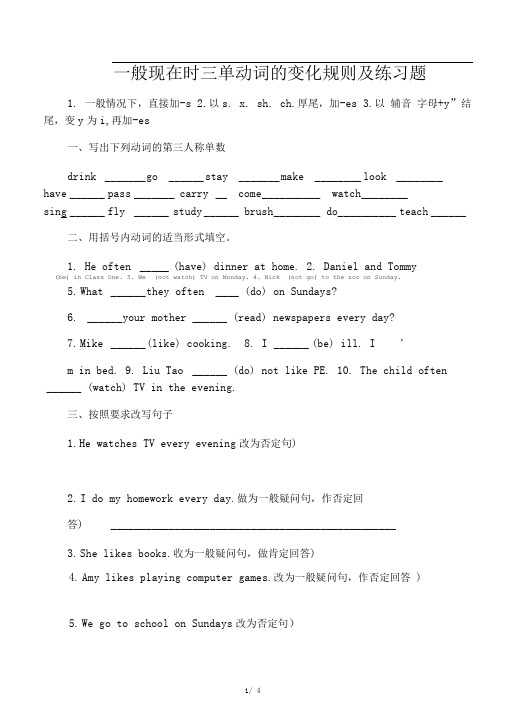
一般现在时三单动词的变化规则及练习题1. 一般情况下,直接加-s2.以s. x. sh. ch.厚尾,加-es3.以辅音字母+y”结尾,变y为i,再加-es一、写出下列动词的第三人称单数drink _______ g o ______ s tay _______ make ________ look ________ have ______ pass _______ carry __ come __________ watch ________sing ______ fly ______ study ______ brush ________ do __________ teach ______二、用括号内动词的适当形式填空。
1. He often _____ (have) dinner at home.2. Daniel and Tommy(be) in Class One. 3. We (not watch) TV on Monday. 4. Nick (not go) to the zoo on Sunday.5.What ______ t hey often ____ (do) on Sundays?6.______ y our mother ______ (read) newspapers every day?7.Mike ______ (like) cooking. 8. I ______ (be) ill. I ’m in bed. 9. Liu Tao ______ (do) not like PE. 10. The child often______ (watch) TV in the evening.三、按照要求改写句子1.H e watches TV every evening改为否定句)2.I do my homework every day.做为一般疑问句,作否定回答) _________________________________________________3.She likes books.收为一般疑问句,做肯定回答)4.Amy likes playing computer games.改为一般疑问句,作否定回答)5.We go to school on Sundays改为否定句)四、改错(划出错误的地方,将正确的写在横线上)1.I s your brother like English? __________________2.Does he likes swimming? __________________3.He likes play games. ____________________4.Shedon ’ tdo her homework on Sundays. _______________五、把句子补充完整。
一般现在时三单动词的变化规则及练习题
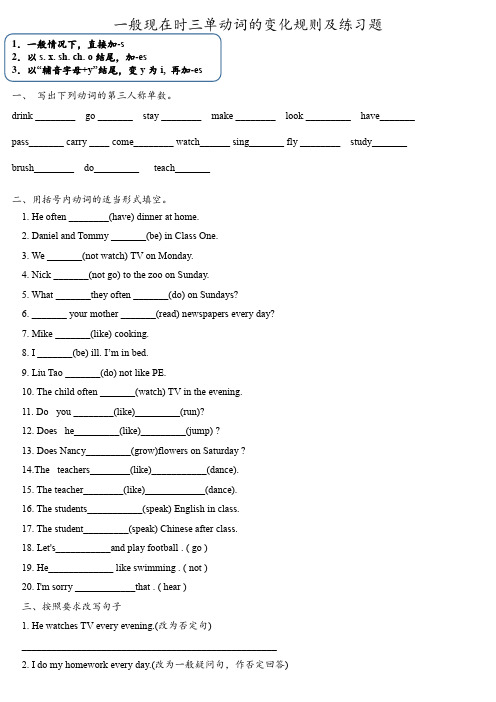
一、写出下列动词的第三人称单数。
drink ________ go _______ stay ________ make ________ look _________ have_______ pass_______ carry ____ come________ watch______ sing_______ fly ________ study_______ brush________ do_________ teach_______二、用括号内动词的适当形式填空。
1. He often ________(have) dinner at home.2. Daniel and Tommy _______(be) in Class One.3. We _______(not watch) TV on Monday.4. Nick _______(not go) to the zoo on Sunday.5. What _______they often _______(do) on Sundays?6. _______ your mother _______(read) newspapers every day?7. Mike _______(like) cooking.8. I _______(be) ill. I’m in bed.9. Liu Tao _______(do) not like PE.10. The child often _______(watch) TV in the evening.11. Do you ________(like)_________(run)?12. Does he_________(like)_________(jump) ?13. Does Nancy_________(grow)flowers on Saturday ?14.The teachers________(like)___________(dance).15. The teacher________(like)____________(dance).16. The students___________(speak) English in class.17. The student_________(speak) Chinese after class.18. Let's___________and play football . ( go )19. He_____________ like swimming . ( not )20. I'm sorry ____________that . ( hear )三、按照要求改写句子1. He watches TV every evening.(改为否定句)___________________________________________________2. I do my homework every day.(改为一般疑问句,作否定回答)________________________________________________3. She likes books.(改为一般疑问句,做肯定回答)_______________________________________________________4. Amy likes playing computer games.(改为一般疑问句,作否定回答)________________________________________________________5. We go to school on Sundays.(改为否定句)_______________________________________________________四. 用所给的人称改写句子。
一般现在时主语三单的动词变化与练习
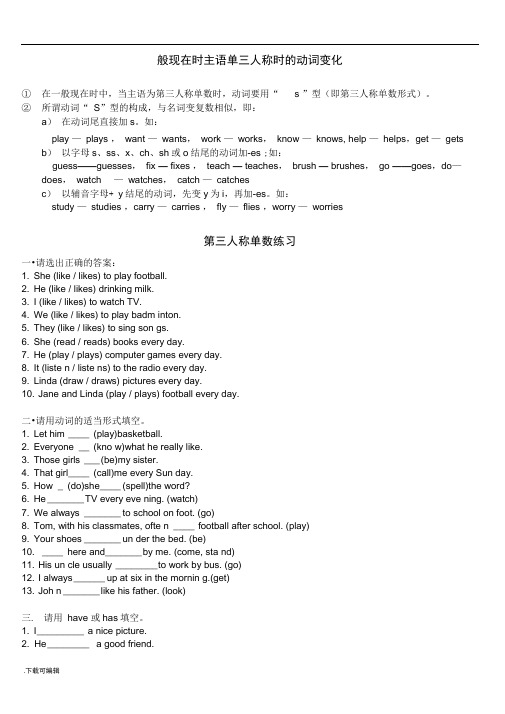
般现在时主语单三人称时的动词变化①在一般现在时中,当主语为第三人称单数时,动词要用“s ”型(即第三人称单数形式)。
②所谓动词“ S”型的构成,与名词变复数相似,即:a)在动词尾直接加s。
如:play —plays ,want —wants,work —works,know —knows, help —helps,get —gets b)以字母s、ss、x、ch、sh或o结尾的动词加-es ;如:guess——guesses,fix — fixes ,teach — teaches,brush — brushes,go ——goes,do—does,watch —watches,catch —catchesc)以辅音字母+ y结尾的动词,先变y为i,再加-es。
如:study —studies ,carry —carries ,fly —flies ,worry —worries第三人称单数练习一•请选出正确的答案:1. She (like / likes) to play football.2. He (like / likes) drinking milk.3. I (like / likes) to watch TV.4. We (like / likes) to play badm inton.5. They (like / likes) to sing son gs.6. She (read / reads) books every day.7. He (play / plays) computer games every day.8. It (liste n / liste ns) to the radio every day.9. Linda (draw / draws) pictures every day.10. Jane and Linda (play / plays) football every day.二•请用动词的适当形式填空。
一般现在时态及第三人称单数附练习及复习资料

一般现在时态及第三人称单数(附练习及答案)第三人称单数问题一般现在时中,当主语是第三人称单数时,即常在动词原形后加或。
第三人称单数变化,现归纳总结如下:1.人称代词, , 是第三人称单数。
如:.他喜欢看电视。
.她十二点吃午餐。
a .它看起来像只猫。
2.单个人名、地名或称呼作主语;用第三人称单数。
如:① .韩梅看起来像她的母亲。
② .北京在中国。
③ .王叔叔经常做蛋糕。
3.单数可数名词或" / / a +单数可数名词"作主语时,是第三人称单数。
如:①A a .马是有用的动物。
② .这本书是你的。
③ .那辆小汽车是红色的。
④'s.这只猫是露茜的。
4.不定代词, , , , 等及指示代词, 作主语时,第三人称单数。
① .大家到齐了。
② .这块手表有毛病。
③ a .这是一支钢笔。
④ .那是一块橡皮擦。
5.不可数名词作主语时为第三人称单数。
如:① . ② .6.当数字或字母作主语时,看作第三人称单数。
如:①"6" a ."6"②"I" a .发音规则动词原形变第三人称单数的规则与发音规律同名词单数变复数大致相同,请认真观察。
1、大多数动词在词尾加“S”在清辅音后发音为[s],在浊辅音及元音后发音为[z]。
如:①-[s] ; -[s]②-[z] ; -[z]2、以辅音字母加“y”结尾的,要先将“y”变为“i”,然后在加“”读[] 如:-[z];-[z]-[z]; -3、以“s, x, , ”结尾的,在词尾加“”,发音为[] 如:-[]; -[]4、以“o”结尾的动词,加“”,读[z] 如:-[z] -[z]注:下面几个动词变为单数时,原词的元音部分的发音发生了较大的变化,请注意记忆。
如:1、[:]-[]2、[]-[]以不发音字母“e”结尾的开音节词,如果尾音是[s],[z]时,加“s”后字母“e”发音,与所加“s”一起读做[]。
(完整版)小学英语语法一般现在时及练习题(最新整理)
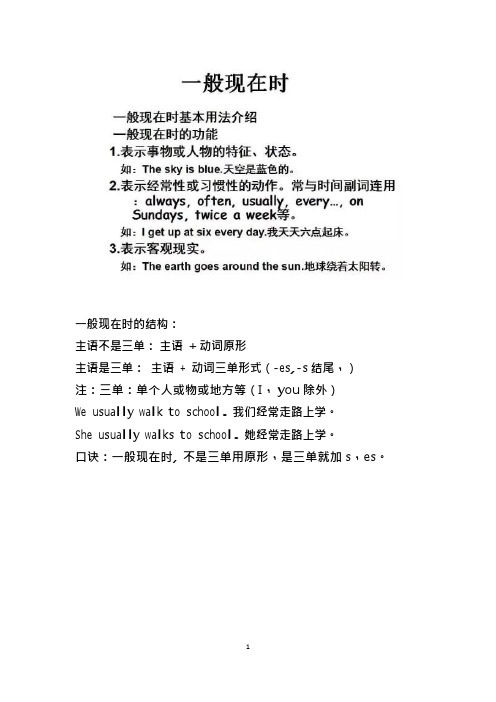
一般现在时的结构:主语不是三单:主语+ 动词原形主语是三单:主语+动词三单形式(-e s,-s结尾,)注:三单:单个人或物或地方等(I, you 除外)W e u s u a ll y w a l k t o s c h oo l.我们经常走路上学。
S h e u s u a ll y w a l k s t o s c h oo l.她经常走路上学。
口诀:一般现在时, 不是三单用原形,是三单就加 s,es。
动词三单形式变化规则1) 一般情况:加-swork—works2) 以s, x, z, sh, ch 或o 结尾: 加-espass—passes, push—pushes,catch—catches, go--goes3) 以辅音字母+y 结尾:改y 为i,加-es(辅音字母是:a,e, i, o, u 以外的字母)fly—flies4) 不规则变化have--has口诀:一般现在时,三单s/es,其他无变化,具体规则要牢记:1)直接加s 2)以s,x,ch,sh,o 结尾+es 3)辅+y,变y 为i,+es 4)特殊情况特殊记,have 变has。
练习题:用所给词的正确形式填空1.W e o f t e n(p l a y)o n t h e p l a y g r o un d.2.H e(g e t)u p a t s i x o’c l o c k.3.y o u(b r u s h)y o u r t ee t h e v e r y m o r n i n g.4.W h a t(do)h e u s u a ll y(do)a f t e r s c h oo l?5.D a nn y(s t u d y)E n g li s h,C h i n e s e,M a t h s,S c i e n c e a n dA r t a t s c h oo l.6.M i k e s o m e t i m e s(go)t o t h e p a r k w i t h h i s s i s t e r.7.A t e i g h t a t n i g h t,s h e(w a t c h)T V w i t h h i s p a r e n t s.8.M i k e(r e a d)E n g li s h e v e r y d a y?9.H o w m a n y l e ss o n s y o u r c l a ss m a t e(h a v e)o n M o n d a y?10.W h a t t i m e h i s m o t h e r(do)t h e h o u s e w o r k?11.H e o f t e n(h a v e)d i nn e r a t h o m e.D a n i e l a n d T o mm y(b e)i n C l a ss O n e.13.W e(n o t w a t c h)T V o n M o n d a y.14.N i c k(n o t go)t o t h e z oo o n S un d a y.15.T h e y(li k e)t h e W o r l d C u p?W h a t t h e y o f t e n(do)o n S a t u r d a y s17.Y o u r p a r e n t s(r e a d)n e w s p a p e r s e v e r y d a y?18.T h e g i r l(t e a c h)u s E n g li s h o n S un d a y s.19.S h e a n d I(t ak e)a w a l k t og e t h e r e v e r y e v e n i n g.20.T h e r e(b e)s o m e w a t e r i n t h e bo tt l e.M i k e(li k e)c oo k i n g.22.T h e y(h a v e)t h e s a m e h obb y.M y a un t(l oo k)a f t e r h e r b a b y c a r e f u ll y.24.Y o u a l w a y s(do)y o u r h o m e w o r k w e ll.I(b e)ill.I’m s t a y i n g i n b e d.26.S h e(go)t o s c h oo l f r o m M o n d a y t o F r i d a y.27.L i u T a o(do)n o t li k e P E.28.T h e c h il d o f t e n(w a t c h)T V i n t h e e v e n i n g.29.S u H a i a n d S u Y a n g(h a v e)e i g h t l e ss o n s t h i s t e r m.30.-W h a t d a y(b e)i t t od a y?-I t’s S a t u r d a y.31.D o n’t m ak e a n o i s e.G r a n dp a(s l ee p).32.T o m’s f a m il y(w a t c h)T V.33.I t(t ak e)m e t w o h o u r s t o f i n i s h m y h o m e w o r k l a s t n i g h t.34.W h a t y o u r m o t h e r(do)e v e r y e v e n i n g?S h e(w a s h)c l o t h e s.35.i t(r a i n)e v e r y d a y?36.W h a t(do)y o u o n S un d a y s?W e(p l a y)f oo t b a ll.37.T h e r e(b e)a f oo t b a ll m a t c h o n T V e v e r y m o r n i n g.38.T h e y o f t e n(v i s i t)t h e G r e a t W a ll.39.W h o(d a n c e)t h e b e s t i n y o u r c l a ss?40.H e(n o t c o m e).41.T h e e a r t h(m o v e)r o un d t h e s un.42S h e(b u y)a s w e a t e r.43.M r.W a n g o f t e n(go)t o S h a n g h a i.二、改句子1.D o y o u o f t e n p l a y f oo t b a ll a f t e r s c h oo l?(肯定回答)2.I h a v e m a n y boo k s.(改为否定句)3.G a o S h a n’s s i s t e r li k e s p l a y i n g t a b l e t e nn i s(改为否定句)4.S h e li v e s i n a s m a ll t o w n n e a r N e w Y o r k.(改为一般疑问句)5.I w a t c h T V e v e r y d a y.(改为一般疑问句)6.D a v i d h a s a go a l.(改为一般疑问句)7.W e h a v e f o u r l e ss o n s.(否定句)8.Nancy doesn’t run fast(肯定句)9.M y dog r un s f a s t.(一般疑问句)(把 10—14 小题变否定句,一般疑问句和划线提问)10.M i k e h a s t w o l e tt e r s f o r h i m.11.I u s u a ll y p l a y f oo t b a ll o n F r i d a y a f t e r n oo n12.S u Y a n g u s u a ll y w a s h e s s o m e c l o t h e s o n S a t u r d a y.13.M i n g m i n g u s u a ll y w a t e r s t h e f l o w e r s e v e r y d a y14.T o m do e s h i s h o m e w o r k a t h o m e.三、写出下列动词的第三人称单数形式:1.wash m a t c h g u e ss studyf i n i s h go s n o w c a rr y2.stop see d r i v e l e tc a rr y k ee p j o i n f i nd t h i n kteach catch3.stay b e g i n forget forgetli e d i e r un p r e f e r g i v er i n g d a n c e h op e四、单项选择:1.T h e r e a n E n g li s h f il m a t t h e c i n e m a n o w.A.w ill h a v eB.i s go i n g t o h a v eC.i s go i n g t o b eD.i s2.T h e p i c t u r e n i c e.A.l oo k sB.i s l oo k e dC.l oo kD.i s l oo k i n g3.S h e do w n a n d s oo n f a ll s a s l ee p.A.li v eB.l a i nC.l a i dD.s i t s4.T h e y t h e o ff i c e i n t i m e v e r y m o r n i n g.A.r e a c h t oB.a rr i v e dC.w e n tD.g e t t o5.W e s h a ll go t o S h a n g h a i o n b u s i n e ss b e f o r e y o u b a c k n e x t w ee k.A.w ill c o m eB.c a m eC.w o u l d c o m eD.c o m e6.T h e p l a n e o v e r t h e r e.A.i sB.a r eC.a mD.w a s7.I s ee h e r t h e r oo m t h i s m o r n i n g.A.t o e n t e rB.e n t e r e dC.e n t e rD.e n t e r s8.T h e t e a c h e r u s t o c o m e t o s c h oo l o n t i m e.A.a s kB.a s k i n gC.a s k sD.a s k e d9.J o hn a l w a y s o t h e r s.A.h e l pB.h e l p i n gC.h e l p sD.t o h e l p10.H e f o r e i g h t h o u r s e v e r y d a y.A.w o r k i n gB.t o w o r kC.w o r k sD.w o r k e d11.Y o u’d b e tt e r a t h o m e a n d y o u r h o m e w o r k.A.t o s t a y,doB.s t a y,doC.t o s t a y,t o doD.s t a y,t o do12.H e s i t s do w n a n d a r e s t.A.h a v i n gB.h a v eC.t o h a v eD.h a s13.U n c l e W a n g n e v e r a c ak e.A.m ak eB.t o m ak eC.m ak i n gD.m ak e s“”“”At the end, Xiao Bian gives you a passage. Minand once said, "people who learn to learn are very happy people.". In every wonderful life, learning is an eternal theme. As a professional clerical and teaching position, I understand the importance of continuous learning, "life is diligent, nothing can be gained", only continuous learning can achieve better self. Only by constantly learning and mastering the latest relevant knowledge, can employees from all walks of life keep up with the pace of enterprise development and innovate to meet the needs of the market. This document is also edited by my studio professionals, there may be errors in the document, if there are errors, please correct, thank you!。
第三人称单数及动词第三人称单数形式变化规则(附练习及答案)
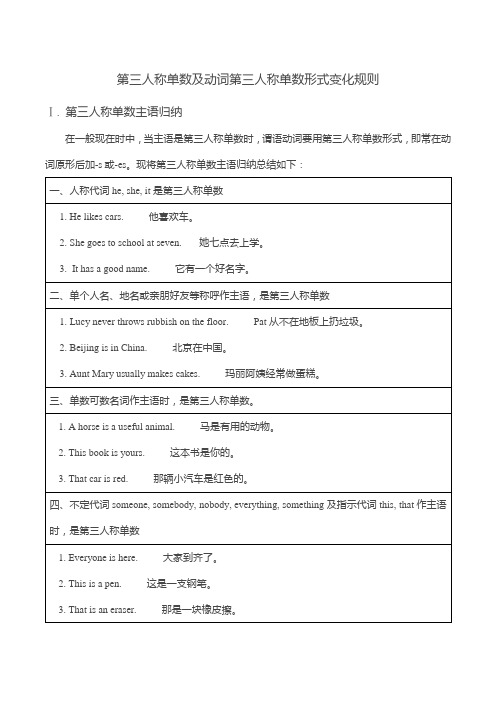
第三人称单数及动词第三人称单数形式变化规则Ⅰ. 第三人称单数主语归纳在一般现在时中,当主语是第三人称单数时,谓语动词要用第三人称单数形式,即常在动词原形后加-s或-es。
现将第三人称单数主语归纳总结如下:Ⅱ. 动词第三人称单数形式变化规则练习及答案一、写出下列动词的第三人称单数。
drink _______ go _______ stay ________ make ________ pass _______ carry_______ come ________ watch _______ fly ________ study_______ brush _______ teach _______ wash_______ guess______ play _______ finish _______二、用括号内动词的适当形式填空。
1. He often ________ (have) dinner at home.2. We _______ (not watch) TV on Monday.3. Nick _______ (not go) to the zoo on Sunday.4. ______ they ________ (like) the World Cup?5. What _______they often _______ (do) on Saturdays?6. _______ your parents _______ (read) newspapers every day?7. The girl _______ (teach) us English on Sundays.8. She and I ________ (take) a walk together every evening.9. There ________ (be) some water in the bottle.10. My aunt _______ (look) after her baby carefully.11. The child often _______ (watch) TV in the evening.12. Su Hai and Su Yang _______ (have) eight lessons this term.答案:一、写出下列动词的第三人称单数。
一般现在时第三人称单数形式用法+练习

一般现在时第三人称单数形式用法+练习(总3页)一般现在时中的第三人称单数形式在一般现在时中,当主语是第三人称单数时,谓语动词要用第三人称单数形式,即常在动词原形后加-s或-es。
(-)什么是一般现在时一般现在时的基本用法有哪些呢?【一般现在时的功能】1 •表示事物或人物的特征、状态。
如:The sky is blue.天空是蓝色的。
2.表示经常性或习惯性的动作。
如:I get up at six every day.我每天六点起床。
Z X标志词(时间状语): a I ways, every week (day, year. I mon th …).once a week, every…,sometimes t at…,on Sunday3•表示客观现实。
如:The earth goes around the sun•地球绕着太阳转。
(-)哪些主语是第三人称单数现归纳总结如下:一、人称代词he, she, it是第三人称单数。
如:He I ikes watching TV.他喜欢看电视。
She has lunch at twe I ve.她十二点吃午餐。
It looks I ike a cat.它看起来像只猫。
二、单个人名、地名或称呼作主语;是第三人称单数。
如:①Tom looks I ike her mother.韩梅看起来像她的母亲。
②Beijing is in China・北京在中国。
③Uncle Wang often makes cakes.王叔叔经常做蛋糕。
三、单数可数名词或壮his / that / the+单数可数名词11作主语时.是第三人称单。
如:®A horse is a useful animal・马是有用的动物。
②Th is book i s yours.这本书是你的。
③That car is red.那辆小汽车是红色的。
④The cat i s Lucy* s.这只猫是露茜的。
一般现在时态及第三人称单数
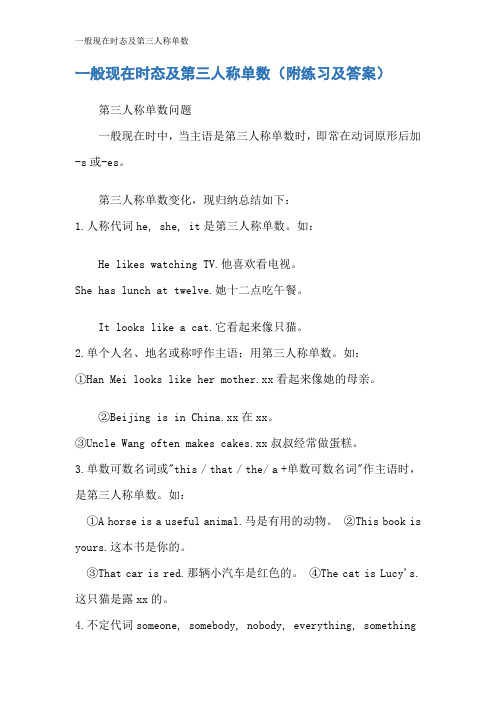
Am I a teacher? Yes, I am. (No, I am not.) Are you his friend? Yes, you are. (No, you are not.)
Is she a nurse? Yes, she is. (No, she is not.)
否定句为:I am not a teacher. You are not his friend. She is not a nurse.
三、第三人称单数问题
一般现在时中,当主语是第三人称单数时,即常在动词原形后加-s或-es。
四、一般现在时分类:
1.一般现在时态分为be 动词的一般现在时。
1) be动词包括am,is,are. 中文为"是", 这三个词的用法要随着主语的变化而变化。 "am" 用于第一人称单数(I); "is" 用于第三人称单数(he,she,it); "are "用于第一人称复数(we),第二人称单数和复数(you), 第三人称复数(they)。 可以记住以下顺口溜: am管 "我", is管",她,它,他", are管"大家"。
- 1、下载文档前请自行甄别文档内容的完整性,平台不提供额外的编辑、内容补充、找答案等附加服务。
- 2、"仅部分预览"的文档,不可在线预览部分如存在完整性等问题,可反馈申请退款(可完整预览的文档不适用该条件!)。
- 3、如文档侵犯您的权益,请联系客服反馈,我们会尽快为您处理(人工客服工作时间:9:00-18:30)。
一般现在时主语单三人称时的动词变化①在一般现在时中,当主语为第三人称单数时,动词要用“s”型(即第三人称单数形式)。
②所谓动词“s”型的构成,与名词变复数相似,即:a)在动词尾直接加s。
如:play—plays,want—wants,work—works,know—knows,help—helps,get—getsb)以字母s、ss、x、ch、sh或o结尾的动词加-es;如:guess—guesses,fix—fixes,teach—teaches,brush—brushes,go—goes,do—does,watch —watches,catch—catchesc)以辅音字母+y结尾的动词,先变y为i,再加-es。
如:study—studies,carry—carries,fly—flies,worry—worries第三人称单数练习一.请选出正确的答案:1. She (like / likes) to play football.2. He (like / likes) drinking milk.3. I (like / likes) to watch TV.4. We (like / likes) to play badminton.5. They (like / likes) to sing songs.6. She (read / reads) books every day.7. He (play / plays) computer games every day.8. It (listen / listens) to the radio every day.9. Linda (draw / draws) pictures every day.10. Jane and Linda (play / plays) football every day.二.请用动词的适当形式填空。
1. Let him _____(play)basketball.2. Everyone_____(know)what he really like.3. Those girls____(be)my sister.4. That girl_____(call)me every Sunday.5. How___(do)she_____(spell)the word?6. He________ TV every evening. (watch)7. We always ________ to school on foot. (go)8. Tom, with his classmates, often ______ football after school. (play)9. Your shoes _______ under the bed. (be)10. ______ here and ______ by me. (come, stand)11. His uncle usually _________ to work by bus. (go)12. I always ______ up at six in the morning.(get)13. John ________ like his father. (look)三.请用have或has填空。
1.I ________ a nice picture.2.He ________ a good friend.3.They _________ some kites.4.We ________ some flowers.5.She __________ a duck.6.My father __________ a new bike.7.Her mother _________ a vase.8.Our teacher _________ an English book.9.Our teachers _________ a basketball.10.Their parents __________ some story books.11.Nancy _______ many skirts.12.David ________ some jackets.13.My friends ________ a football.14.What do you ________ ?15.What does Mike ________ ?四.否定句:在动词前+doesn't或don't.1. She_____ _____(do)her homework every day.2. He_____ _____(live)in Shanghai.3. He_____ _____(need)a pair pf shoes.4. Danny_____ _____(see)the apple tree?5. She_____ _____(come)from America.6. The girl_____ _____(look)out of the window and sees many birds in the sky.五.Do还是Does我来选。
1. [Do/Does]______ he watch TV at night? Yes he does.2. [Do/Does]______ you go to school everyday? No, I don’t.3. [Do/Does]______ Jack and Peter like apples?4. [Do/Does]______ Tina go swimming on Sunday?5. [Do/Does]______they play football? Yes, they ___[do/does].6. [Do/Does]______ we have a good teacher? Yes, we ____[do/does].7. [Do/Does]_____ they jump rope ? No, they ___[do not/does not].8. [Do/Does]_____your dog walk in the zoo?9. [Do/Does]____ I have a big nose? No, you _____[do not/does not].10. [Do/Does]____ your cats eat fish? Yes, they _____.[do/does].11. [Do/Does]_____ their mothers go shopping? No, they ____[do not/does not].12. I ___[do not/ does not] speak Japanese. [Do/Does] _____you speak Japanese?六.请用动词的适当形式填空。
1._____the desk_____(have)four legs?Yes, it does.2._____she____(do)her homework every day?Yes, she does.3._____he_____(live)in Jinan?No, he doesn't.4._____he_____(need)a pair of shoes?NO, he doesn't.5. Does Danny_____(see)the apple tree?6._____she_____(come)from America?Yes, she_____.7._____the girl_____(look)out of the window and sees many birds in the sky? No, she_____.8. Jenny runs home and_____(sit)on the chair?七、选择题:1. I _____ to school every day.A. goB. goesC. going2. He _____ teeth every morning.A. brushB. brushesC. brushing3. The birds_____ singing.A. likeB. likesC. like to4. What does Lily _____ doing?A. likeB. likesC. to5. _____ you like eating apples?A. DoB. DoesC. Doing6. _____ he swim every afternoon?A. DoB. DoesC. Doing7. Tom likes _____ in the classroom.A. singingB. singC. to singing8. –Does Sally like swimming?--No, she .A. doB. doesC. doesn’t9. Peter and Mary _____ milk every day.A. drinkB. drinkingC. drinks10. _____ they read English every day?A. DoesB. AreC. Do八、把下列句子变为否定句:1. She draws pictures every day.2. We like playing football.九、把下列句子变为一般疑问句,并做肯定回答。
1. Linda swims every day.2. They like playing games.。
